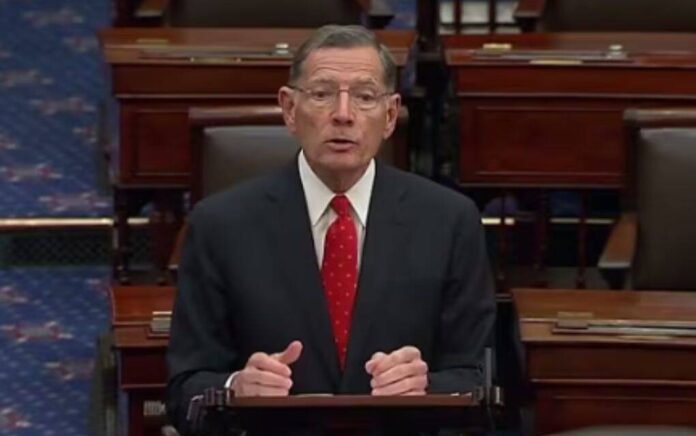
The Democrats have been playing the role of spoilers. They’re not lifting a finger in Congress.
That’s why Democrats are in for a rude awakening after what Senate Leadership just warned them about.
Senate Republicans Push to Overcome Democrats’ Nominee Confirmation Delays
Senate Republicans are exploring options to counter Democrats’ tactics that have significantly slowed the confirmation of President Donald Trump’s nominees. Frustrated by the delays, Trump has pressed Senate GOP leaders to clear a backlog of approximately 150 nominees awaiting final approval or skip the customary August recess to keep processing votes. On Tuesday, several Senate Republicans indicated they might pursue changes to Senate rules to speed up confirmations, bypassing the obstacles created by Democrats.
“Everything is under consideration,” Senate Majority Whip John Barrasso told reporters. “This has been an unprecedented, historic blockade by the Democrats. Presidents deserve to get their team in place as does President Trump.”
“If the Democrats don’t change their behavior, we’re going to need to change the way things are done,” Barrasso added. Republicans in the Senate are increasingly vocal about their frustration with Democrats’ refusal to allow expedited confirmations, signaling the end of their patience with these delays.
By July 29 of his presidency, former President Joe Biden had 44 nominees confirmed via voice vote. Throughout his term, Senate Republicans allowed 57% of his nominees to be confirmed through voice vote or unanimous consent, according to the Senate Republican Communications Center (SRCC).
In contrast, Senate Democrats have not allowed any of Trump’s nominees to skip a roll call vote, which would streamline the confirmation process. Only one nominee, Secretary of State Marco Rubio, was permitted to bypass a procedural vote, though Democrats still required a final confirmation vote despite no opposition to his nomination.
The 109 other confirmed nominees have faced multiple roll call votes, consuming significant floor time under Senate Majority Leader John Thune. Some nominees appointed in January remain stalled, awaiting approval due to Democrats’ tactics.
“What we’re seeing is so much obstruction, historic obstruction, that I think we’ve got to find a better way to get these [nominees] done,” Republican West Virginia Sen. Shelley Moore Capito, a member of Republican leadership, told reporters. “We can’t keep going on like this. It’s not fair to the president.”
The Senate GOP is considering rule changes to accelerate confirmations, some of which could pass with a simple majority vote.
Sen. Rand Paul of Kentucky expressed support for revising Senate rules to streamline the process. “One change would be to eliminate cloture motion on nominees and eliminate a motion to proceed and just have one vote and leave committee and have one vote,” Paul said.
“And I think, really, the caucus is inclined to do something like that,” Paul continued. “The push is going to come to shove if there is no negotiation and no settlement before that — I believe that the rules will change.”
Sen. Ron Johnson of Wisconsin suggested reducing the number of executive branch positions requiring Senate confirmation, proposing a cut of at least several hundred roles.
Republicans are also discussing adjustments to debate rules to speed up floor consideration for nominees. “We need to find ways like we’ve reformed in the past to get to simple 51 votes for the Supreme Court, to get to 51 votes for two hour cloture [votes] for some lesser important positions,” Sen. Steve Daines shared. “But I think for some of the other nominations we should continue to reform the rules of the Senate that allows the Senate to move faster.”
Some Republicans are prepared to forgo the August recess to continue confirmation votes. “[I] hope that my Democratic friends come to their senses and cooperate, which is unlikely,” Sen. John Kennedy told reporters, indicating his willingness to stay in session if needed.
Senate Majority Leader John Thune, speaking at a GOP leadership press conference, emphasized the need for change. “We’ve had to kind of grind through, and that’s what we’re going to keep doing,” Thune said. “It is the far left of their caucus that is preventing even good government people, people who are bipartisan, from getting confirmed. So that’s got to change, and if it doesn’t, we’re going to be here a while.”



















